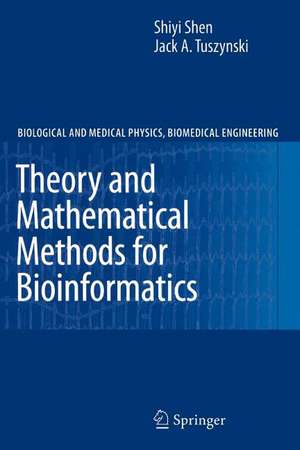Theory and Mathematical Methods in Bioinformatics: Biological and Medical Physics, Biomedical Engineering
Autor Shiyi Shenen Limba Engleză Paperback – 19 noi 2010
| Toate formatele și edițiile | Preț | Express |
|---|---|---|
| Paperback (1) | 687.63 lei 6-8 săpt. | |
| Springer Berlin, Heidelberg – 19 noi 2010 | 687.63 lei 6-8 săpt. | |
| Hardback (1) | 939.89 lei 6-8 săpt. | |
| Springer Berlin, Heidelberg – 21 feb 2008 | 939.89 lei 6-8 săpt. |
Din seria Biological and Medical Physics, Biomedical Engineering
- 5%
 Preț: 1102.14 lei
Preț: 1102.14 lei - 18%
 Preț: 989.55 lei
Preț: 989.55 lei - 18%
 Preț: 944.58 lei
Preț: 944.58 lei - 18%
 Preț: 704.10 lei
Preț: 704.10 lei - 18%
 Preț: 951.07 lei
Preț: 951.07 lei - 18%
 Preț: 932.91 lei
Preț: 932.91 lei - 15%
 Preț: 630.91 lei
Preț: 630.91 lei - 15%
 Preț: 634.11 lei
Preț: 634.11 lei - 15%
 Preț: 653.88 lei
Preț: 653.88 lei - 18%
 Preț: 1640.95 lei
Preț: 1640.95 lei - 18%
 Preț: 925.18 lei
Preț: 925.18 lei - 18%
 Preț: 940.68 lei
Preț: 940.68 lei - 18%
 Preț: 934.19 lei
Preț: 934.19 lei - 15%
 Preț: 626.08 lei
Preț: 626.08 lei - 18%
 Preț: 931.51 lei
Preț: 931.51 lei - 15%
 Preț: 626.08 lei
Preț: 626.08 lei -
 Preț: 390.35 lei
Preț: 390.35 lei - 18%
 Preț: 1216.11 lei
Preț: 1216.11 lei - 15%
 Preț: 633.64 lei
Preț: 633.64 lei - 18%
 Preț: 930.59 lei
Preț: 930.59 lei - 15%
 Preț: 700.22 lei
Preț: 700.22 lei - 18%
 Preț: 936.81 lei
Preț: 936.81 lei - 18%
 Preț: 928.43 lei
Preț: 928.43 lei - 18%
 Preț: 1207.55 lei
Preț: 1207.55 lei - 5%
 Preț: 1398.64 lei
Preț: 1398.64 lei - 18%
 Preț: 1369.73 lei
Preț: 1369.73 lei - 15%
 Preț: 640.23 lei
Preț: 640.23 lei - 18%
 Preț: 937.56 lei
Preț: 937.56 lei - 18%
 Preț: 939.76 lei
Preț: 939.76 lei - 15%
 Preț: 634.11 lei
Preț: 634.11 lei - 5%
 Preț: 1079.95 lei
Preț: 1079.95 lei - 18%
 Preț: 943.02 lei
Preț: 943.02 lei - 15%
 Preț: 632.81 lei
Preț: 632.81 lei - 5%
 Preț: 1145.73 lei
Preț: 1145.73 lei - 5%
 Preț: 1084.06 lei
Preț: 1084.06 lei - 18%
 Preț: 936.02 lei
Preț: 936.02 lei - 18%
 Preț: 930.59 lei
Preț: 930.59 lei - 18%
 Preț: 936.02 lei
Preț: 936.02 lei - 15%
 Preț: 691.35 lei
Preț: 691.35 lei - 18%
 Preț: 937.56 lei
Preț: 937.56 lei - 5%
 Preț: 1008.41 lei
Preț: 1008.41 lei - 15%
 Preț: 633.95 lei
Preț: 633.95 lei - 18%
 Preț: 939.89 lei
Preț: 939.89 lei - 15%
 Preț: 636.50 lei
Preț: 636.50 lei
Preț: 687.63 lei
Preț vechi: 808.98 lei
-15% Nou
Puncte Express: 1031
Preț estimativ în valută:
131.64€ • 135.38$ • 109.21£
131.64€ • 135.38$ • 109.21£
Carte tipărită la comandă
Livrare economică 19 februarie-05 martie
Preluare comenzi: 021 569.72.76
Specificații
ISBN-13: 9783642094293
ISBN-10: 3642094295
Pagini: 464
Ilustrații: XVI, 445 p. 47 illus.
Dimensiuni: 155 x 235 x 24 mm
Greutate: 0.64 kg
Ediția:Softcover reprint of hardcover 1st ed. 2008
Editura: Springer Berlin, Heidelberg
Colecția Springer
Seria Biological and Medical Physics, Biomedical Engineering
Locul publicării:Berlin, Heidelberg, Germany
ISBN-10: 3642094295
Pagini: 464
Ilustrații: XVI, 445 p. 47 illus.
Dimensiuni: 155 x 235 x 24 mm
Greutate: 0.64 kg
Ediția:Softcover reprint of hardcover 1st ed. 2008
Editura: Springer Berlin, Heidelberg
Colecția Springer
Seria Biological and Medical Physics, Biomedical Engineering
Locul publicării:Berlin, Heidelberg, Germany
Public țintă
Professional/practitionerCuprins
Outline.- Outline.- Mutations and Alignments.- Stochastic Models of Mutations and Structural Analysis.- Modulus Structure Theory.- Super Pairwise Alignment.- Multiple Sequence Alignment.- Network Structures of Multiple Sequences Induced by Mutation.- Alignment Space.- Protein Configuration Analysis.- Background Information Concerning the Properties of Proteins.- Informational and Statistical Iterative Analysis of Protein Secondary Structure Prediction.- Three-Dimensional Structure Analysis of the Protein Backbone and Side Chains.- Alignment of Primary and Three-Dimensional Structures of Proteins.- Depth Analysis of Protein Spatial Structure.- Analysis of the Morphological Features of Protein Spatial Structure.- Semantic Analysis for Protein Primary Structure.
Notă biografică
Shiyi Shen
Since 1985, professor of mathematics, 1987-1998: chair of the department of mathematics, and the dean of the college of mathematical sciences; a standing committee of China Mathematical Society, the director of the Tianjin Mathematical Society. 1984-1986: visiting scholar of Cornell University; visiting scholar of Stanford University, and visiting researcher at the Hong Kong Chinese University. Shiyi Shen's fields of scientific interest are informatics and bioinformatics. His publications include about 60 journal papers and 6 books (Chinese).
Jack Tuszynski
Professor (from 07/1993 until present). Department of Physics, University of Alberta
Research Manager of the Neurons Group, (May 1, 2000- June 1, 2001) Starlab NV, Brussels, Belgium
Visiting Professor, Department of Physics, Ecole Normale Superieure, Lyon, France (December 2000, June-September 2001)
Senior Visiting Fellow, Laboratory of Biomolecular Dynamics, Catholic University of Leuven, Belgium (November-December 2000 and February-March 2001)
Adjunct Professor (from March 1, 2000). Department of Oncology, Division of Medical Physics, University of Alberta.
Visiting Professor (07/1995 - 09/1995). Institut für Theoretische Physik, J. Liebig-Universität Gießen, Germany.
Visiting Professor (07/1993 - 08/1994). Institut für Theoretische Physik, H.Heine-Universität Düsseldorf, Germany.
McCalla Professor (07/1992 - 07/1993). Department of Physics, University of Alberta.
Guest Professor (summer 1992), Visting Scientist (summer 1994, spring 1996). Institute of Mathematical Modelling, Danish Technical University, Lyngby.
Associate Professor (07/1990 - 07/1993). Department of Physics, University of Alberta, Edmonton. Tenure granted effective July 1, 1991.
Assistant Professor (01/1988 - 06/1990). Department of Physics,University of Alberta, Edmonton. Field: theoretical condensed matter physics.
Honorary Assistant Professor (01/1988 - 01/1991). Department of Physics, Memorial University of Newfoundland, St. John's, Newfoundland.
Assistant Professor (09/1983 - 01/1988). Department of Physics, Memorial University of Newfoundland, St. John's. Field: theoretical condensed matter physics. Tenure granted as of September 1, 1987.
Post-doctoral Fellow (04/1983 - 09/1983). Chemistry Department, The University of Calgary. Supervisor: Professor R. Paul. Field: Molecular biophysics.
Since 1985, professor of mathematics, 1987-1998: chair of the department of mathematics, and the dean of the college of mathematical sciences; a standing committee of China Mathematical Society, the director of the Tianjin Mathematical Society. 1984-1986: visiting scholar of Cornell University; visiting scholar of Stanford University, and visiting researcher at the Hong Kong Chinese University. Shiyi Shen's fields of scientific interest are informatics and bioinformatics. His publications include about 60 journal papers and 6 books (Chinese).
Jack Tuszynski
Professor (from 07/1993 until present). Department of Physics, University of Alberta
Research Manager of the Neurons Group, (May 1, 2000- June 1, 2001) Starlab NV, Brussels, Belgium
Visiting Professor, Department of Physics, Ecole Normale Superieure, Lyon, France (December 2000, June-September 2001)
Senior Visiting Fellow, Laboratory of Biomolecular Dynamics, Catholic University of Leuven, Belgium (November-December 2000 and February-March 2001)
Adjunct Professor (from March 1, 2000). Department of Oncology, Division of Medical Physics, University of Alberta.
Visiting Professor (07/1995 - 09/1995). Institut für Theoretische Physik, J. Liebig-Universität Gießen, Germany.
Visiting Professor (07/1993 - 08/1994). Institut für Theoretische Physik, H.Heine-Universität Düsseldorf, Germany.
McCalla Professor (07/1992 - 07/1993). Department of Physics, University of Alberta.
Guest Professor (summer 1992), Visting Scientist (summer 1994, spring 1996). Institute of Mathematical Modelling, Danish Technical University, Lyngby.
Associate Professor (07/1990 - 07/1993). Department of Physics, University of Alberta, Edmonton. Tenure granted effective July 1, 1991.
Assistant Professor (01/1988 - 06/1990). Department of Physics,University of Alberta, Edmonton. Field: theoretical condensed matter physics.
Honorary Assistant Professor (01/1988 - 01/1991). Department of Physics, Memorial University of Newfoundland, St. John's, Newfoundland.
Assistant Professor (09/1983 - 01/1988). Department of Physics, Memorial University of Newfoundland, St. John's. Field: theoretical condensed matter physics. Tenure granted as of September 1, 1987.
Post-doctoral Fellow (04/1983 - 09/1983). Chemistry Department, The University of Calgary. Supervisor: Professor R. Paul. Field: Molecular biophysics.
Textul de pe ultima copertă
This monograph addresses, in a systematic and pedagogical manner, the mathematical methods and the algorithms required to deal with the molecularly based problems of bioinformatics. The book will be useful to students, research scientists and practitioners of bioinformatics and related fields, especially those who are interested in the underlying mathematical methods and theory. Among the methods presented in the book, prominent attention is given to pair-wise and multiple sequence alignment algorithms, stochastic models of mutations, modulus structure theory and protein configuration analysis. Strong links to the molecular structures of proteins, DNA and other biomolecules and their analyses are developed. In particular, for proteins an in-depth exposition of secondary structure prediction methods should be a valuable tool in both molecular biology and in applications to rational drug design. The book can also be used as a textbook and for this reason most of the chapters include exercises and problems at the level of a graduate program in bioinformatics.
Caracteristici
Clearly explains the mathematical concepts behind bioinformatics Makes direct connections to biomolecular structures such as proteins, DNA and RNA Includes supplementary material: sn.pub/extras











